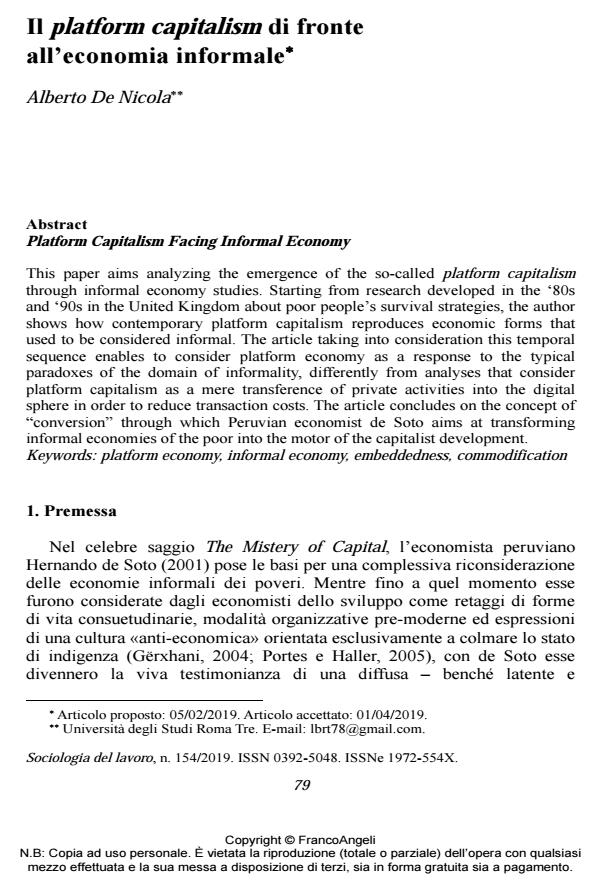Il platform capitalism di fronte all’economia informale
Titolo Rivista SOCIOLOGIA DEL LAVORO
Autori/Curatori Alberto De Nicola
Anno di pubblicazione 2019 Fascicolo 2019/154
Lingua Italiano Numero pagine 18 P. 79-96 Dimensione file 231 KB
DOI 10.3280/SL2019-154005
Il DOI è il codice a barre della proprietà intellettuale: per saperne di più
clicca qui
Qui sotto puoi vedere in anteprima la prima pagina di questo articolo.
Se questo articolo ti interessa, lo puoi acquistare (e scaricare in formato pdf) seguendo le facili indicazioni per acquistare il download credit. Acquista Download Credits per scaricare questo Articolo in formato PDF

FrancoAngeli è membro della Publishers International Linking Association, Inc (PILA), associazione indipendente e non profit per facilitare (attraverso i servizi tecnologici implementati da CrossRef.org) l’accesso degli studiosi ai contenuti digitali nelle pubblicazioni professionali e scientifiche.
This paper aims analyzing the emergence of the so-called platform capitalism through informal economy studies. Starting from research developed in the ‘80s and ‘90s in the United Kingdom about poor people’s survival strategies, the author shows how contemporary platform capitalism reproduces economic forms that used to be considered informal. The article taking into consideration this temporal sequence enables to consider platform economy as a response to the typical paradoxes of the domain of informality, differently from analyses that consider platform capitalism as a mere transference of private activities into the digital sphere in order to reduce transaction costs. The article concludes on the concept of "conversion" through which Peruvian economist de Soto aims at transforming informal economies of the poor into the motor of the capitalist development.
Il contributo si propone di indagare l’emergere di alcune forme del cosiddetto platform capitalism alla luce degli studi sull’economia informale. Partendo dalle ricerche che si sono svolte tra gli anni Ottanta e i Duemila nel Regno Unito sulle strategie di sopravvivenza dei poveri, si mostrerà come alcune più recenti attività dell’economia di piattaforma replichino forme economiche precedentemente collocate nel campo dell’informalità. Differentemente dalle analisi che hanno visto l’affermazione del capitalismo delle piattaforme come il mero trasferimento di attività private nella dimensione digitale e rispondente al solo motivo della riduzione dei costi di transazione, questa sequenza temporale consentirà di interpretare le economie di piattaforma come una risposta ai paradossi tipici del dominio dell’informalità. Il contributo terminerà con la discussione della nozione di "conversione" con la quale l’economista peruviano de Soto indicava l’obiettivo di trasformare le economie informali dei poveri in motori dello sviluppo capitalistico.
Parole chiave:Economia di piattaforma, economia informale, embeddedness, mercificazione
Alberto De Nicola, Il platform capitalism di fronte all’economia informale in "SOCIOLOGIA DEL LAVORO " 154/2019, pp 79-96, DOI: 10.3280/SL2019-154005